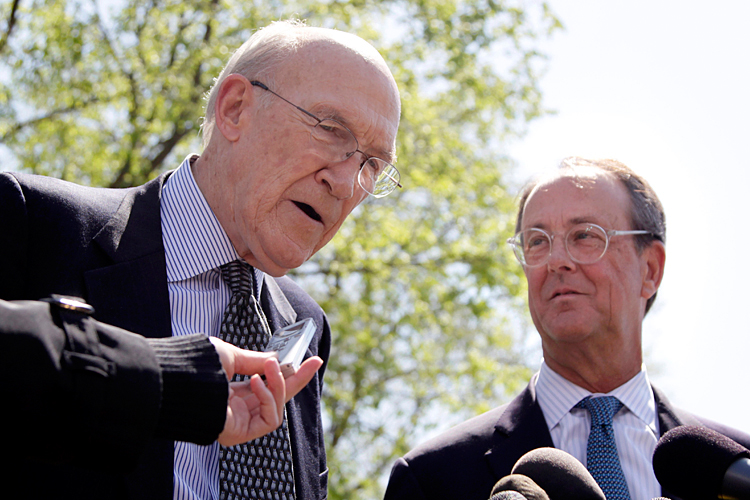Alan Simpson and Erskine Bowles would like you to know that they are still around and still have some plans and they would still like a “grand bargain.” The best friends forever were granted space on the Washington Post editorial page to make their case for common-sense deficit reduction achieved through a series of politically impossible compromises.
Simpson and Bowles have been speaking to the people, and the people agree with them!
No matter our audience, those we spoke with shared two things: a thirst for the truth about what it will take to right our fiscal ship and a willingness to be part of the solution so long as everyone is in it together.
Basically these two are nostalgic for December when it seemed like a “grand bargain” might actually happen:
In December, the two parties were as close as they’ve ever been on a plan to put our fiscal house in order. Although they did not reach agreement, we continue to believe that broader compromise is possible. In particular, President Obama deserves a lot of credit for his budget, which lays the foundation for constructive bipartisan discussions by incorporating the tough choices and politically difficult compromises contained in the last offer he made during negotiations with House Speaker John Boehner in December.
While the president’s budget represents a significant step forward, it does not go as far as necessary to keep our debt declining as a percent of our economy. There are significant, substantive differences between the parties on key issues. But we hope that instead of retreating to their respective partisan corners, leaders in both parties will work to bridge the divide.
I don’t know what’s different about their new plan and don’t care. If it’s anything like their second plan, it’s a “compromise” that is further to the right than their initial plan, which called for massive tax increases. According to their Op-Ed, their new plan still raises the Medicare eligibility age and also, hilariously, cuts taxes. (“Our plan raises revenue through comprehensive tax reform that lowers rates….”) The Op-Ed is titled “A grand bargain is still possible. Here’s how.” Oddly, nothing in the Op-Ed actually explains how a “grand bargain” would actually pass either the House or the Senate. Thankfully, it seems extremely unlikely that one will.
Since the president idiotically appointed them to his deficit-reduction panel, Simpson and Bowles have become the most respected human beings in all of Washington. It was necessary, for two years, for every serious politician to announce that he supported “the Simpson-Bowles plan,” even though in reality almost no one actually did. Recently, though, their brand has lost some luster. The economy is barely growing and joblessness is still a major crisis. The longer that is the case (and it has already been the case for the entirety of the Obama administration) the less urgent deficit-reduction seems.
Simpson and Bowles, amusingly, released their newest plan on Friday, April 19 — which you may remember as the day everyone in the country was following the search for Dzhokhar Tsarnaev. This deprived the roll-out of a bit of the publicity that attended their previous plans. Also, since their initial plan, British and European austerity measures have caused massive suffering with no economic benefit. The famous Reinhart-Rogoff paper arguing that high debt led to economic contraction was found to be massively flawed.
In other words, the bipartisan “sound serious about the debt” consensus is suddenly in danger. Minutes after the Simpson-Bowles Op-Ed went up, the Post published an Op-Ed by Washington Post moderate liberal E.J. Dionne denouncing the debt obsession and calling for expansionary fiscal policy. (Madness!)
Politico reports that, crazily, some moderate Democrats — not “wild-eyed liberals” but sensible centrists — now accept basic Keynsian economics. This being Politico, a voice of the Beltway elite consensus, this acceptance of mainstream economic opinion is still treated as exotic and bizarre.
“This group could make it even harder for President Barack Obama to strike a grand bargain because they increasingly see no immediate need for either new spending cuts or significantly more revenue, both of which they say could further slow the economy,” Politico says of these crazy whack jobs who believe that the unemployment crisis is more real and significant than long-term federal debt. Oh, no! (What is actually making it “hard” for the president to fix the deficit by lowering tax rates and making social insurance plans less generous is, weirdly, Republicans, who rhetorically support all of those things but who in practice prefer top-down class warfare to deficit reduction. And those Republicans have saved us all from a grand bargain.)
So it suddenly seems like a bit of cautious optimism about the elite conversation might be justified. Simpson and Bowles are being ignored. Deficit hysteria is a bit less fashionable than it has been. Congress, as we all know, is only responsive to rich people. But rich people are honestly better off if non-rich people can afford to pay rent and buy things. And some rich people seem to have begun to realize this. And we all owe Eric Cantor and Paul Ryan our thanks for killing Simpson and Bowles’ dream.

